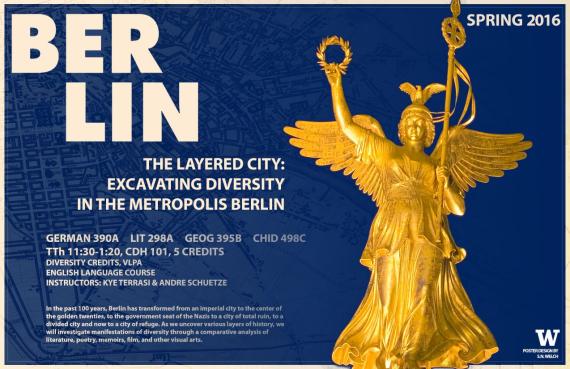Germanics is offering an exciting new urban humanities course in English for Spring 2016.
BERLIN
The Layered City: Excavating Diversity in the Metropolis Berlin
In the past 100 years, Berlin has transitioned from an imperial city to the center of the golden twenties, to the government seat of the Nazis to a city of total ruin, to a divided city and now to a city of refuge. As we uncover these various layers of history, we will investigate manifestations of diversity through a comparative analysis of literature, poetry, memoirs, film and other visual arts. Students will explore prevalent themes of diversity such as gender and sexuality, socio-economic disparity, ethnic, racial and national identity, assimilation and migration and their relation to the city. An examination of texts such as Nabakov's King, Queen, Knave, Irmgard Keun's The Artificial Silk Girl, Peter Weiss' Aesthetics of Resistance, Monika Maron's Flight of Ashes and Wladimir Kaminer's Russendisko, films such as Different from Others, A Foreign Affair and When We Leave and artists and movements such as die Brücke, Hannah Höch and Ai Weiwei underscores the social, sexual, racial and economic tensions that pervaded this city. Finally, with the primary material read against a variety of social, historical and theoretical texts pertinent to the topics and the era from writers such as Walter Benjamin and Georg Simmel, this course will inquire into the relationship between the political, intellectual and social change of Berlin and the development of urban space. As an extension of this, we will also reflect on other urban environments in order to contextualize and situate our exploration of Berlin within a globalized perspective.
In this course, students will produce reflective and analytical response papers that will allow them to approach the material in an interdisciplinary manner by examining literary texts, visual images and theoretical perspectives in conjunction with one another, thereby developing their critical thinking skills and their ability to identify and connect the common issues that emerge. Students will develop their awareness for different types of diversity manifested in the primary material and be able to examine their own beliefs and experiences through a different cultural lens. Through a team project students will work collaboratively to extend their exploration of Berlin beyond the scope of the course to create projects related to contemporary Berlin. Students could focus on current affairs, Berlin startups, blogs, the music scene, a comparison between diverse quarters of Berlin versus less diverse quarters of the city in order to work with authentic material and take a hands on approach to understanding diversity in Berlin. These projects underscore Germany's increased interaction and integration with other cultures and traditions, which will allow the students to move beyond the cultural specificity of the course to see how modern Berlin fits into and influences a global world.
English is the language of instruction and course readings.
